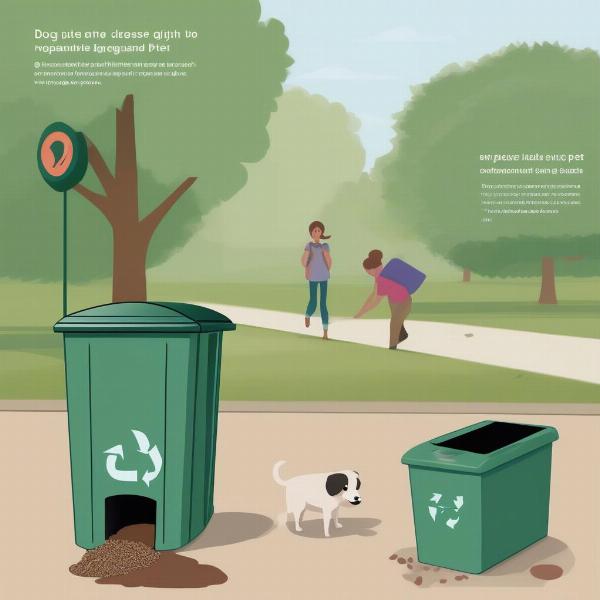Dog bags are an essential tool for responsible dog ownership. Keeping our streets and parks clean is a crucial part of being a good pet owner. This guide will delve into various aspects of dog bags, from choosing the right type to proper disposal methods, helping you make informed decisions that benefit both your pet and the environment.
Choosing the Right Dog Bag
When it comes to dog bags, there’s more variety than you might think. From biodegradable options to scented bags and even hands-free dispensers, finding the right bag for you and your dog can make walks much more pleasant. Consider these factors when making your selection:
- Material: Biodegradable bags are a popular choice for environmentally conscious pet owners. Look for bags made from plant-based materials like cornstarch. Traditional plastic bags are still widely available but take significantly longer to decompose.
- Thickness: Nobody wants a messy mishap! Opt for a thicker bag to prevent tears and leaks. This is especially important if your dog is a large breed.
- Scent: Scented bags can help mask unpleasant odors, making the cleanup process a bit more bearable.
- Size: Choose a size appropriate for your dog’s breed. Larger breeds will require larger bags.
- Dispenser Options: Hands-free dispensers can be attached to your leash, making cleanup quick and convenient.
Proper Disposal of Dog Waste
Picking up after your dog is only half the battle. Proper disposal is equally important. Follow these guidelines for responsible waste management:
- Use Designated Bins: Most parks and public areas provide designated bins for pet waste. Utilize these whenever possible.
- Double Bagging: If a designated bin isn’t available, double bagging can help contain odors and prevent leaks until you can find a suitable disposal location.
- Never Flush Dog Waste: Unless specifically labeled as flushable, dog waste should never be flushed down the toilet. It can contaminate water sources and clog plumbing systems.
- Composting (with caution): Some pet owners choose to compost dog waste. However, this requires a dedicated pet waste compost system, not your regular garden compost, due to potential pathogens.
 Proper Dog Poop Disposal
Proper Dog Poop Disposal
Why Using Dog Bags Matters
Using dog bags isn’t just about being considerate; it’s about protecting public health and the environment. Dog waste can contain harmful bacteria and parasites that contaminate soil and water sources. Leaving dog waste on the ground poses health risks to other pets and even humans. Additionally, nobody enjoys stepping in a forgotten pile!
Dog Bags for Different Occasions
Whether you’re on a quick walk around the block or embarking on a long hike, having the right dog bag for walks is essential. Consider these scenarios:
- Everyday Walks: A standard roll of biodegradable bags and a leash dispenser are perfect for daily routines.
- Hiking and Camping: Pack extra bags and consider a portable, sealable container to store used bags until you can dispose of them properly.
- Travel: Small, compact rolls of bags are ideal for travel. Look for travel-sized dispensers that easily attach to your leash or bag.
What if I forget my dog bags?
Forgetting your dog bags poop can happen. If you find yourself in this situation, be resourceful. Look for any available materials like leaves or newspaper to temporarily pick up the waste and dispose of it responsibly as soon as possible. Consider carrying a small, spare roll of bags in your car or jacket pocket for emergencies.
Customizing your Dog Bag Experience
For those who want to add a personal touch, custom dog bag and monogrammed dog bag options are available. These can be a fun way to express your dog’s personality or simply keep track of your bags. Some companies even offer hot dog bags with insulated linings for carrying food.
Conclusion
Dog bags are a small but significant part of responsible pet ownership. By choosing the right bag, disposing of waste properly, and understanding the importance of cleanup, you contribute to a cleaner, healthier environment for everyone. Remember, a little effort goes a long way in keeping our communities and green spaces enjoyable for both pets and people.
- What are the best biodegradable dog bags? Look for bags made from plant-based materials like cornstarch. Check certifications to ensure they meet compostability standards.
- Can I flush dog waste down the toilet? Generally, no. Unless specifically labeled as flushable, dog waste should be disposed of in a trash can or designated pet waste bin.
- How do I choose the right size dog bag? Consider your dog’s breed and size. Larger breeds will require larger bags.
- What are the benefits of using a hands-free dispenser? They make cleanup quick and convenient, allowing you to keep one hand free while walking your dog.
- What should I do if I forget my dog bags? Be resourceful and use any available materials like leaves or newspaper to temporarily pick up the waste and dispose of it properly as soon as possible.
- Where can I buy custom dog bags? Many online retailers and pet stores offer custom and monogrammed dog bag options.
- Can I compost dog waste? Yes, but it requires a dedicated pet waste compost system, not your regular garden compost.
About ILM Dog: ILM Dog provides expert advice on all aspects of dog care, from breed selection and health to training and nutrition. We are passionate about helping dog owners provide the best possible care for their furry companions. Our website offers comprehensive resources, product recommendations, and expert insights to help you navigate the joys and challenges of dog ownership. For any inquiries, contact us at [email protected] or call us at +44 20-3965-8624.